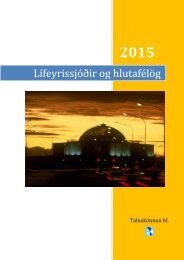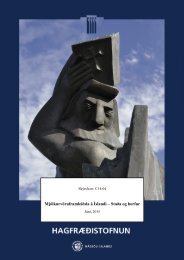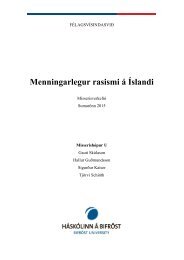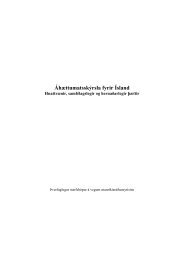Create successful ePaper yourself
Turn your PDF publications into a flip-book with our unique Google optimized e-Paper software.
WORLD REPORT 2016<br />
HUMAN RIGHTS WATCH<br />
Meaningful progress in 2015 was evident in the February adoption of a 2015-<br />
2019 judicial reform plan; improved conditions for judges; the sanctioning of<br />
several judges for corruption and unprofessional conduct by the newly established<br />
Superior Council of Judges (Conseil Supérieur de la Magistrature);<br />
progress in the revision of key legal texts—including the penal code, the Code of<br />
Criminal Procedure, and the Code of Military Justice—to bring them in line with<br />
international standards; the recruitment of some 50 new magistrates; improvements<br />
in case management; improvement in the delivery of water and healthcare<br />
in Guinea’s largest prison; and the construction, underway, of a new prison<br />
envisioned to address overcrowding. The Military Tribunal was also established,<br />
though it had yet to begin hearing cases at time of writing.<br />
Efforts to ensure justice for mob and communal violence were accompanied by<br />
allegations of a lack of judicial independence. In April 2015, a court sentenced 11<br />
people to life in prison for the mob killing of eight health workers, local officials,<br />
and journalists in Womey village, in Guinea’s southern forest region, during the<br />
2014 Ebola outbreak.<br />
However, human rights groups said the judiciary failed to investigate the attacks<br />
or hold to account members of the security forces implicated in rape, pillage,<br />
and other abuses in the Womey incident aftermath. Similarly, 13 convictions of<br />
men implicated in a deadly spate of 2013 communal violence in the southern region<br />
of N’Zérékoré, which left some 200 people dead, failed to investigate the<br />
role of several politicians perceived to be close to the ruling party in the violence.<br />
Judicial bailiffs, responsible for the execution of many judicial decisions,<br />
denounced the frequent political interference with their work.<br />
Legislative and Institutional Framework<br />
Human rights progress in the legislative framework was evident in the late 2014<br />
adoption of the National Strategy for Justice Sector Reform; the January 2015 establishment<br />
of an independent human rights institution as mandated by<br />
Guinea’s 2010 constitution, albeit not in line with the Paris Principles; and the<br />
June 2015 passage of the Public Order Bill strengthening civilian control over the<br />
security services.<br />
Guinea has still not ratified the Optional Protocol to the Convention against Torture<br />
and other Cruel, Inhuman or Degrading Treatment or Punishment, or the Op-<br />
tional Protocol to the Convention on the Elimination of All Forms of Discrimination<br />
against Women. Furthermore, Guinea has yet to codify the crime of torture<br />
into its penal code. Guinea has also not ratified the protocol to the African Charter<br />
on Human and Peoples’ Rights on the Establishment of an African Court of<br />
Human and Peoples’ Rights.<br />
The Ministry for Human Rights and Civil Liberties, created in 2012, actively promoted<br />
respect for human rights, despite budgetary constraints. Minister Gassama<br />
Kalifa Diaby visited prisons, liaised with civil society, and advocated for<br />
strengthening the judiciary and respecting freedom of the press.<br />
Security Forces<br />
Discipline within and civilian control over the security forces appeared to have<br />
improved, and authorities seemed to show slightly increased willingness to<br />
sanction those implicated in violations and ensure security force personnel response<br />
to judicial summons. The military hierarchy ensured that the army and<br />
presidential guard remained in barracks, and those mandated to respond to civil<br />
unrest—the police and gendarmerie—did so proportionally and subject to civilian<br />
control.<br />
However, in 2015, members of the security forces were implicated in numerous<br />
incidents of excessive use of lethal force, resulting in the deaths of several protesters,<br />
abusive conduct and the mistreatment of detainees as they responded<br />
to protests and criminality. The security forces were also implicated in numerous<br />
acts of extortion, bribe-taking, outright theft and banditry, and, to a lesser extent,<br />
torture and rape.<br />
The security forces have long demonstrated a lack of political neutrality evident<br />
in the use of racial slurs, and failure to provide equal protection to citizens of all<br />
ethnic and religious groups, notably those supporting the political opposition.<br />
Key International Actors<br />
Guinea’s key international partners, notably the UN, ECOWAS, the EU, France,<br />
and the US largely focused on keeping the presidential elections on track, while<br />
donors supported programs to address the aftermath of the Ebola health crisis,<br />
strengthen the rule of law and improve discipline within the security sector.<br />
284<br />
285










